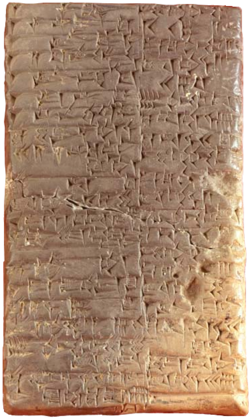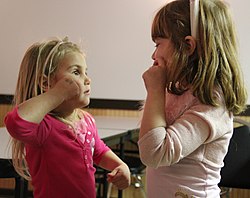Portal:Language
Introduction




Language is a structured system of communication that consists of grammar and vocabulary. It is the primary means by which humans convey meaning, both in spoken and signed forms, and may also be conveyed through writing. Human language is characterized by its cultural and historical diversity, with significant variations observed between cultures and across time. Human languages possess the properties of productivity and displacement, which enable the creation of an infinite number of sentences, and the ability to refer to objects, events, and ideas that are not immediately present in the discourse. The use of human language relies on social convention and is acquired through learning.
Estimates of the number of human languages in the world vary between 5,000 and 7,000. Precise estimates depend on an arbitrary distinction (dichotomy) established between languages and dialects. Natural languages are spoken, signed, or both; however, any language can be encoded into secondary media using auditory, visual, or tactile stimuli – for example, writing, whistling, signing, or braille. In other words, human language is modality-independent, but written or signed language is the way to inscribe or encode the natural human speech or gestures.
Depending on philosophical perspectives regarding the definition of language and meaning, when used as a general concept, "language" may refer to the cognitive ability to learn and use systems of complex communication, or to describe the set of rules that makes up these systems, or the set of utterances that can be produced from those rules. All languages rely on the process of semiosis to relate signs to particular meanings. Oral, manual and tactile languages contain a phonological system that governs how symbols are used to form sequences known as words or morphemes, and a syntactic system that governs how words and morphemes are combined to form phrases and utterances.
The scientific study of language is called linguistics. Critical examinations of languages, such as philosophy of language, the relationships between language and thought, how words represent experience, etc., have been debated at least since Gorgias and Plato in ancient Greek civilization. Thinkers such as Jean-Jacques Rousseau (1712–1778) have argued that language originated from emotions, while others like Immanuel Kant (1724–1804) have argued that languages originated from rational and logical thought. Twentieth century philosophers such as Ludwig Wittgenstein (1889–1951) argued that philosophy is really the study of language itself. Major figures in contemporary linguistics include Ferdinand de Saussure and Noam Chomsky. (Full article...)
Selected language -

French (français [fʁɑ̃sɛ] ⓘ or langue française [lɑ̃ɡ fʁɑ̃sɛːz] ⓘ) is a Romance language of the Indo-European family. Like all other Romance languages, it descended from the Vulgar Latin of the Roman Empire. French evolved from Northern Old Gallo-Romance, a descendant of the Latin spoken in Northern Gaul. Its closest relatives are the other langues d'oïl—languages historically spoken in northern France and in southern Belgium, which French (Francien) largely supplanted. It was also influenced by native Celtic languages of Northern Roman Gaul and by the Germanic Frankish language of the post-Roman Frankish invaders. As a result of French and Belgian colonialism from the 16th century onward, it was introduced to new territories in the Americas, Africa, and Asia, and numerous French-based creole languages, most notably Haitian Creole, were established. A French-speaking person or nation may be referred to as Francophone in both English and French.
French is an official language in 26 countries, as well as one of the most geographically widespread languages in the world, with about 50 countries and territories having it as a de jure or de facto official, administrative, or cultural language. Most of these countries are members of the Organisation internationale de la Francophonie (OIF), the community of 54 member states which share the official use or teaching of French. It is estimated to have about 310 million speakers, of which about 80 million are native speakers; it is spoken as a first language (in descending order of the number of speakers) in France, Canada (provinces of Quebec, Ontario, and New Brunswick), Belgium (Wallonia and the Brussels-Capital Region), western Switzerland (Romandy region), parts of Luxembourg, parts of the United States (Louisiana, Maine, New Hampshire, and Vermont), Monaco, the Aosta Valley region of Italy, and various communities elsewhere. (Full article...)
Did you know (auto-generated)

- ... that the author of The Power of Babel says that speakers of Swedish, Norwegian, and Danish are all speaking the same language?
- ... that the Ocoee salamander from Tennessee is named after the Cherokee word for Passiflora incarnata (passionflower)?
- ... that Tolkien may have devised the sundering of the Elves to justify the existence of two distinct Elvish languages in his legendarium?
- ... that History of the Mission of the Evangelical Brothers in the Caribbean by C. G. A. Oldendorp was the first book to publish Igbo-language terms in 1777?
- ... that the newspaper Qizil Tugh (Red Banner) provided a publishing platform for young Uyghur-language poets and writers in the Soviet Union?
- ... that "Plaza", a recognized Basque surname, comes from the Spanish language?
More did you know -
- ...that linguist Asim Peco is an expert in the language of eastern Herzegovina?
- ...that three different languages that used to be spoken in Nicaragua are now extinct?
- ...that Russian is spoken in Israel by about 20% of the total population?
- ...that the name of the koala derives from the word gula in Dharuk and other Yuin–Kuric languages?
Categories
Linguistics: Computational linguistics • Grammar • Historical linguistics • Morphology • Phonetics • Phonology • Pragmatics • Reading • Semantics • Sociolinguistics • Syntax • Writing
Languages: Language families • Pidgins and creoles • Sign languages
Linguists: By nationality • Historical linguists • Morphologists • Phoneticians • Phonologists • Sociolinguists • Syntacticians • Translators
Stubs: Constructed languages • Languages • Linguists • Pidgins and creoles • Typography • Vocabulary and usage • Writing systems
Full Language category tree
|
|---|
|
Select [►] to view subcategories
|
Related portals
Selected topic -
Latin obscenity is the profane, indecent, or impolite vocabulary of Latin, and its uses. Words deemed obscene were described as obsc(a)ena (obscene, lewd, unfit for public use), or improba (improper, in poor taste, undignified). Documented obscenities occurred rarely in classical Latin literature, limited to certain types of writing such as epigrams, but they are commonly used in the graffiti written on the walls of Pompeii and Herculaneum. Among the documents of interest in this area is a letter written by Cicero in 45 BC (ad Fam. 9.22) to a friend called Paetus, in which he alludes to a number of obscene words without actually naming them.
Apart from graffiti, the writers who used obscene words most were Catullus and Martial in their shorter poems. Another source is the anonymous Priapeia (see External links below), a collection of 95 epigrams supposedly written to adorn statues of the fertility god Priapus, whose wooden image was customarily set up to protect orchards against thieves. The earlier poems of Horace also contained some obscenities. However, the satirists Persius and Juvenal, although often describing obscene acts, did so without mentioning the obscene words. Medical, especially veterinary, texts also use certain anatomical words that, outside of their technical context, might have been considered obscene. (Full article...)
Selected picture -

Countries and regions where Portuguese has official status
Language News
- 1 March 2025 – Executive orders in the second presidency of Donald Trump
- United States President Donald Trump signs an executive order designating English as the country's official language. (The Guardian)
- 27 February 2025 –
- OpenAI releases their latest large language model, GPT-4.5. (The Verge)
Topics

Languages of Africa: Arabic, Chadic, Cushitic, Kanuri, Maasai, Setswana, Swahili, Turkana, Xhosa, Yoruba, Zulu, more...
Languages of the Americas: Aleut, Carib, Cherokee, Inuktitut, Iroquois, Kootenai, Mayan, Nahuatl, Navajo, Quechuan, Salish, American Sign Language, more...
Languages of Asia: Arabic, Assamese, Balochi, Bengali, Chinese, Japanese, Hajong, Hebrew, Hindustani, Kannada, Kokborok, Marathi, Khasi, Korean, Kurdish, Malayalam, Manipuri, Meithei, Mongolian, Persian, Rajasthani, Sindhi, Sanskrit, Sylheti, Tamil, Tanchangya, Tulu, Telugu, Tibetan, Thai, Turkish, Vietnamese, Khowar, more...
Languages of Austronesia: Austric, Fijian, Hawaiian, Javanese, Malagasy, Malay, Maori, Marshallese, Samoan, Tahitian, Tagalog, Tongan, Auslan, more...
Languages of Europe: Basque, Czech, Danish, Dutch, English (book), French, German, Greek, Italian, Latin, Leonese, Norwegian, Polish, Portuguese, Romanian, Russian, Slovak, Spanish, Ukrainian more...
Constructed languages: Esperanto, Ido, Volapük, more...
Agglutinative language, Analytic language, Constructed language, Creole, Context-free language, Extinct language, Dialect, Fusional language, Inflectional language, International language, Isolating language, Language isolate, National language, Natural language, Pidgin, Pluricentric language, Polysynthetic language, Proto-language, Sign language, Spoken language, Synthetic language, Variety (linguistics)

Applied linguistics, Cognitive linguistics, Accent (dialect), Computational linguistics, Descriptive linguistics, Eurolinguistics, Generative linguistics, Historical linguistics, Lexicology, Lexical semantics, Morphology, Onomasiology, Phonetics, Phonology, Pragmatics, Prescription, Prototype semantics, Psycholinguistics, Semantics, Stylistics, Sociolinguistics, Syntax
See also: List of linguists

Alphabets: Arabic alphabet, Bengali alphabet, Cyrillic alphabet, Hebrew alphabet, Latin alphabet, more...
Other writing systems: Abjad, Abugida, Braille, Hieroglyphics, Logogram, Syllabary, SignWriting, more..
See also: History of the alphabet, Script
Associated Wikimedia
The following Wikimedia Foundation sister projects provide more on this subject:
-
Commons
Free media repository -
Wikibooks
Free textbooks and manuals -
Wikidata
Free knowledge base -
Wikinews
Free-content news -
Wikiquote
Collection of quotations -
Wikisource
Free-content library -
Wikiversity
Free learning tools -
Wiktionary
Dictionary and thesaurus
Find a language
| Enter an ISO 639 code to find the corresponding language article |





















